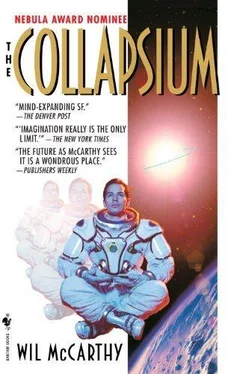Wil McCarthy - The Collapsium
Здесь есть возможность читать онлайн «Wil McCarthy - The Collapsium» весь текст электронной книги совершенно бесплатно (целиком полную версию без сокращений). В некоторых случаях можно слушать аудио, скачать через торрент в формате fb2 и присутствует краткое содержание. Город: New York, Год выпуска: 2000, ISBN: 2000, Издательство: Del Rey/Ballantine, Жанр: Фантастика и фэнтези, на английском языке. Описание произведения, (предисловие) а так же отзывы посетителей доступны на портале библиотеки ЛибКат.
- Название:The Collapsium
- Автор:
- Издательство:Del Rey/Ballantine
- Жанр:
- Год:2000
- Город:New York
- ISBN:0-345-40856-X
- Рейтинг книги:3 / 5. Голосов: 1
-
Избранное:Добавить в избранное
- Отзывы:
-
Ваша оценка:
- 60
- 1
- 2
- 3
- 4
- 5
The Collapsium: краткое содержание, описание и аннотация
Предлагаем к чтению аннотацию, описание, краткое содержание или предисловие (зависит от того, что написал сам автор книги «The Collapsium»). Если вы не нашли необходимую информацию о книге — напишите в комментариях, мы постараемся отыскать её.
The Collapsium — читать онлайн бесплатно полную книгу (весь текст) целиком
Ниже представлен текст книги, разбитый по страницам. Система сохранения места последней прочитанной страницы, позволяет с удобством читать онлайн бесплатно книгу «The Collapsium», без необходимости каждый раз заново искать на чём Вы остановились. Поставьте закладку, и сможете в любой момент перейти на страницу, на которой закончили чтение.
Интервал:
Закладка:
“Let us,” Rhea corrected.
At the table across from them, the four bright Martians broke a huddle and rose to their feet. “Declarant,” the indigo man said, “may we accompany you as well?”
“And I?” another voice said, elsewhere in the banquet hall.
“And we?” A bishop and her husband.
“Myself? Yes?”
Soon the voices were everywhere, and Bruno realized he was yet again the center of attention, something he had never sought to be—had in fact fought not to be. Rather than answer the many voices, Bruno stood and waved his hands dismissively: Yes, yes, do as you wish; my permission is hardly required. Sliding his chair back, he turned and made for the staircase with long, purposeful strides. Marlon Sykes fell in half a step behind him, Her Majesty and her robots half a step behind that, and behind her came the Kroghs and Wenders Rodenbeck, and behind them were sounds of a rising crowd as Rruno mounted the stairs and began to climb.
Around the passage’s first lazy curve there came another, sharper one in the opposite direction, and beyond that lay a thick sheet of curved glass that was part wall, part ceiling. Behind it the mountain shot up in a fist of blunt rock, the little staircase winding up it like a varicose vein, lit with periodic circles of soft wellstone light. Not jagged on the outside, this mountain, this Skadi Peak on the crown of Maxwell Monies. No, soft metals had once frosted here right out of the atmosphere’s furnace, and eons of hot, thick, corrosive wind had swept over it like ocean currents, inexorable, smoothing every contour, actually polishing in places, so that the tinned, leaded rock shone almost wetly in the twilight. What Skadi looked like, more than anything, was a cheap computer graphic, a platonic ideal of mountainness. Or perhaps a tall scoop of chocolate ice cream, just beginning to slump in summer’s heat. Here and there, patches of blue and green and butterscotch lichen interrupted the smooth silver-browns of windswept basalt.
“Door,” Bruno said to the glass, and obligingly, it opened for him, a rectangle of wellwood appearing in the glass and swinging upward on creaky, faux iron hinges. The wind swirled in at once, whistling, much thinner and less cold than he’d been expecting. He stepped through.
Beside him, Marlon Sykes noted, “You know, I’m not sure that actually seeing the fractal structure of the collapsiter will help you, particularly. You seem to have worked out the crucial insight already.”
“Yes? Well, we shall see.” He drew a deep breath, sampling, releasing it with the hint of a cough. Ernest Krogh had not exaggerated the air’s impurity—it tickled the lungs, filled them without wholly satisfying them. It reeked faintly but distinctly of sulfur. It was dry and cool and seemed to suck the moisture right out of him. It was, he thought, good enough for a mere kilometer’s hike.
“Can you breathe?” he asked Marlon.
Inhaling deeply, the Declarant nodded. “Adequately, yes.”
“Majesty?”
Tamra sniffed, wrinkled her nose, then finally nodded. “It will do, yes.”
There were others behind her, dozens of others, but he felt no need to interrogate each of them. Whatever Tamra might say, people were responsible primarily to and for themselves, and if the air displeased them they could, obviously, go back downstairs and finish their dessert.
Bruno pointed with his shoulder. “Upward, then!”
The climb commenced.
The stairs were less smooth than the rock face around them. Rough; perhaps deliberately so, though traction didn’t pose much of a problem. With the latest clothing technology a sheet of smooth glass might have served nearly as well, boot soles finding and clinging to the tiniest bumps and ridges, or holding fast with suckered tentacles where no such imperfections presented. The climb was steep, though, and there was no banister, just the edges of the stairwell groove itself, wobbling up and down from ankle to shoulder height and back again as it passed through the tallowy features of the rock face. Above, the stars winked and glittered through postsun-set haze and burnt-orange smog—glittered in precisely the way they never had on Bruno’s tiny planet, with its too-low, too-thin atmosphere.
“Invigorating,‘’ he said, relishing the feeling of being truly outdoors, on a real planet, for the first time in years. The cool wind alone was a new, freshly real sensation as it puffed through his beard, pulled his hair aside in streamers, fluttered at the brim of his hat.
“Yeah, whatever,” Marlon muttered beside him. Tamra grunted something unintelligible in a similar tone as her guards clanked along beside her.
The first hundred meters seemed trivial enough, and the second hundred, but halfway through the third he detected Tamra’s voice well behind him, and turned to see her dropping wearily, setting one buttock down on the edge of a tall stair. She looked at him half plaintively, half commandingly.
“Keep climbing like that, and you’re going to send someone home in a cast,” she said.
He grunted, with mingled amusement and annoyance. Rolling injured limbs in foamed plastic was pure hyperbole; nobody treated fractures that way anymore. Why bother, when the injured party could simply be hurled into the nearest fax, murdered, disassembled, and replaced with a perfect—and perfectly healed—duplicate who’d thank you for the service? But as a figure of speech, Bruno grasped it implicitly: he was somehow in charge of this expedition, somehow responsible for all who followed behind him, and he was failing to take proper care. Everyone was healthy these days, well muscled and aerobically fit. Faxware saw to that. But that wasn’t quite the same, he reflected, as actual exercise, which after all got one used to a certain amount of hardship and strain. He supposed all those walks around the world had done some good after all.
Beside him, Marlon appeared hale enough, if a bit flushed and pink against the white of his jacket. But he saw that Rodenbeck and the Kroghs had overtaken Tamra, and behind her along the snaking stairway were strewn what must surely be the party’s entire guest list, in varying stages of fatigue. Some looked fit, eager, though reluctant to crowd past the Queen on her resting stair, or the halberd-bearing robots looming on the steps immediately above and below. Others, farther back, climbed more slowly and deliberately, and behind them lay a great many who slogged with great heaviness, as if their feet were shod with iron, as if the Earthlike gravity of Venus were far more than they were accustomed to, but also as if this climb were a matter of strange importance to them, an historic event in which they were determined to take part. The news cameras, he saw, had also returned, zipping and buzzing around the invisible, two-hundred meter cordon.
He could almost hear the voices echoing back from some distant future: “I was there on Skadi Peak, when de Towaji climbed it to examine the Ring Collapsiter. You’ve seen recorded images, maybe saw it live on the network, but I was actually there.” The notion bothered Bruno for several reasons, first because it underscored this fame, this unseemly significance that dogged him always, whatever he did, and second because it presumed, axiomatically, that there was a future to look back from. That he would, in other words, fix the Ring Collapsiter, single-handedly saving the Queendom from its otherwise certain doom. What basis did they have for such an assumption? What right did they have to demand it of him, if not of themselves?
He wondered how eager and solicitous their faces would be if the blasted thing fell in. Plenty of time to worry, no doubt; the collapsium’s lattice holes would widen slowly at first, gobbling solar protons only occasionally, later perhaps a few neutrons. They’d play hell with the sun in the meantime, of course, ejecting flares, wreaking massive disturbances, creating localized zones of greatly increased density as solar matter crowded in around the holes but was not immediately swallowed. Would there be pockets of neutronium kicking around inside the convection zones? Settling in toward the core and then pulling the core in after them? Eventually, no doubt. Eventually.
Читать дальшеИнтервал:
Закладка:
Похожие книги на «The Collapsium»
Представляем Вашему вниманию похожие книги на «The Collapsium» списком для выбора. Мы отобрали схожую по названию и смыслу литературу в надежде предоставить читателям больше вариантов отыскать новые, интересные, ещё непрочитанные произведения.
Обсуждение, отзывы о книге «The Collapsium» и просто собственные мнения читателей. Оставьте ваши комментарии, напишите, что Вы думаете о произведении, его смысле или главных героях. Укажите что конкретно понравилось, а что нет, и почему Вы так считаете.












